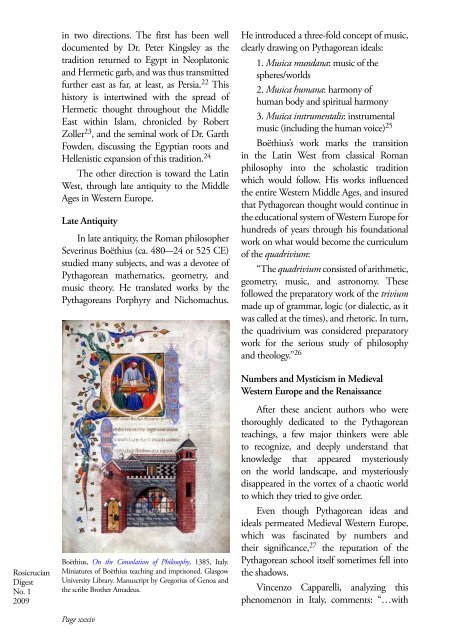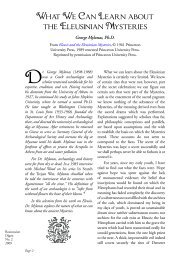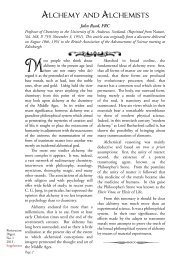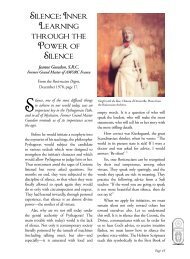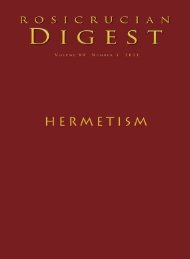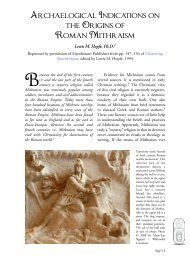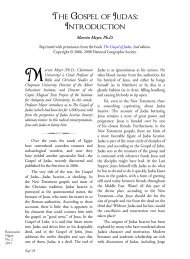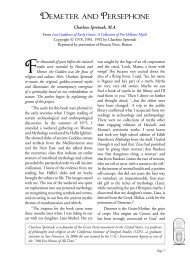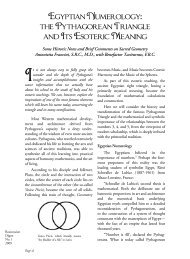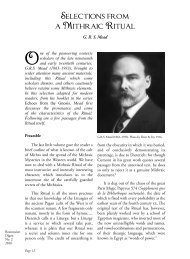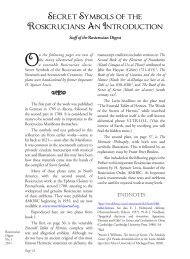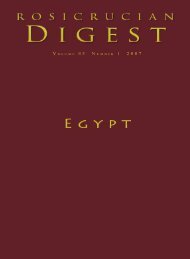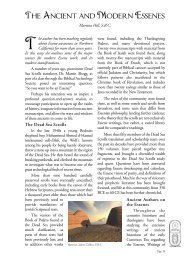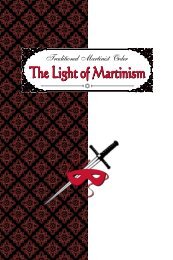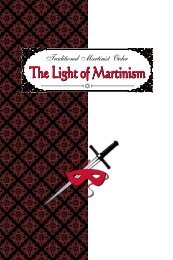Pythagorean Teachings across the Centuries - Rosicrucian Order
Pythagorean Teachings across the Centuries - Rosicrucian Order
Pythagorean Teachings across the Centuries - Rosicrucian Order
Create successful ePaper yourself
Turn your PDF publications into a flip-book with our unique Google optimized e-Paper software.
in two directions. The first has been well<br />
documented by Dr. Peter Kingsley as <strong>the</strong><br />
tradition returned to Egypt in Neoplatonic<br />
and Hermetic garb, and was thus transmitted<br />
fur<strong>the</strong>r east as far, at least, as Persia. 22 This<br />
history is intertwined with <strong>the</strong> spread of<br />
Hermetic thought throughout <strong>the</strong> Middle<br />
East within Islam, chronicled by Robert<br />
Zoller 23 , and <strong>the</strong> seminal work of Dr. Garth<br />
Fowden, discussing <strong>the</strong> Egyptian roots and<br />
Hellenistic expansion of this tradition. 24<br />
The o<strong>the</strong>r direction is toward <strong>the</strong> Latin<br />
West, through late antiquity to <strong>the</strong> Middle<br />
Ages in Western Europe.<br />
Late Antiquity<br />
In late antiquity, <strong>the</strong> Roman philosopher<br />
Severinus Boëthius (ca. 480–-24 or 525 CE)<br />
studied many subjects, and was a devotee of<br />
<strong>Pythagorean</strong> ma<strong>the</strong>matics, geometry, and<br />
music <strong>the</strong>ory. He translated works by <strong>the</strong><br />
<strong>Pythagorean</strong>s Porphyry and Nichomachus.<br />
He introduced a three-fold concept of music,<br />
clearly drawing on <strong>Pythagorean</strong> ideals:<br />
1. Musica mundana: music of <strong>the</strong><br />
spheres/worlds<br />
2. Musica humana: harmony of<br />
human body and spiritual harmony<br />
3. Musica instrumentalis: instrumental<br />
music (including <strong>the</strong> human voice) 25<br />
Boëthius’s work marks <strong>the</strong> transition<br />
in <strong>the</strong> Latin West from classical Roman<br />
philosophy into <strong>the</strong> scholastic tradition<br />
which would follow. His works influenced<br />
<strong>the</strong> entire Western Middle Ages, and insured<br />
that <strong>Pythagorean</strong> thought would continue in<br />
<strong>the</strong> educational system of Western Europe for<br />
hundreds of years through his foundational<br />
work on what would become <strong>the</strong> curriculum<br />
of <strong>the</strong> quadrivium:<br />
“The quadrivium consisted of arithmetic,<br />
geometry, music, and astronomy. These<br />
followed <strong>the</strong> preparatory work of <strong>the</strong> trivium<br />
made up of grammar, logic (or dialectic, as it<br />
was called at <strong>the</strong> times), and rhetoric. In turn,<br />
<strong>the</strong> quadrivium was considered preparatory<br />
work for <strong>the</strong> serious study of philosophy<br />
and <strong>the</strong>ology.” 26<br />
<strong>Rosicrucian</strong><br />
Digest<br />
No. 1<br />
2009<br />
Boëthius, On <strong>the</strong> Consolation of Philosophy, 1385, Italy.<br />
Miniatures of Boëthius teaching and imprisoned. Glasgow<br />
University Library. Manuscript by Gregorius of Genoa and<br />
<strong>the</strong> scribe Bro<strong>the</strong>r Amadeus.<br />
Page xxxiv<br />
Numbers and Mysticism in Medieval<br />
Western Europe and <strong>the</strong> Renaissance<br />
After <strong>the</strong>se ancient authors who were<br />
thoroughly dedicated to <strong>the</strong> <strong>Pythagorean</strong><br />
teachings, a few major thinkers were able<br />
to recognize, and deeply understand that<br />
knowledge that appeared mysteriously<br />
on <strong>the</strong> world landscape, and mysteriously<br />
disappeared in <strong>the</strong> vortex of a chaotic world<br />
to which <strong>the</strong>y tried to give order.<br />
Even though <strong>Pythagorean</strong> ideas and<br />
ideals permeated Medieval Western Europe,<br />
which was fascinated by numbers and<br />
<strong>the</strong>ir significance, 27 <strong>the</strong> reputation of <strong>the</strong><br />
<strong>Pythagorean</strong> school itself sometimes fell into<br />
<strong>the</strong> shadows.<br />
Vincenzo Capparelli, analyzing this<br />
phenomenon in Italy, comments: “…with


